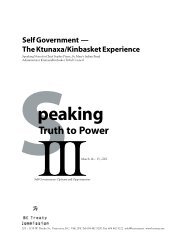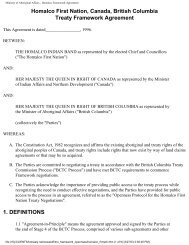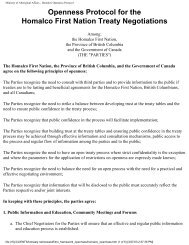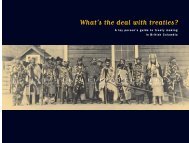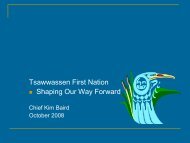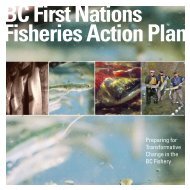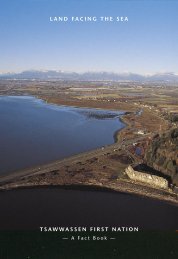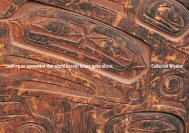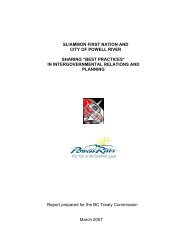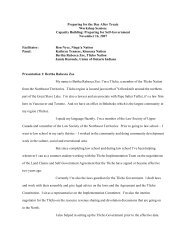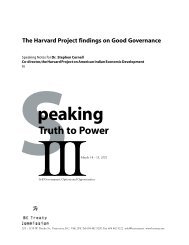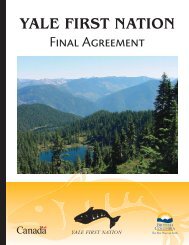Talking Circles Among Aboriginal Women - BC Treaty Commission
Talking Circles Among Aboriginal Women - BC Treaty Commission
Talking Circles Among Aboriginal Women - BC Treaty Commission
You also want an ePaper? Increase the reach of your titles
YUMPU automatically turns print PDFs into web optimized ePapers that Google loves.
PastWhy are we negotiating treaties inBritish Columbia?Before Canada was a country Britain recognized that aboriginal people living here had title to land: the RoyalProclamation of 1763 declared that only the British Crowncould acquire land from First Nations, and that was typically done through treaties. In most parts of Canada, the British Crown established treaties with First Nationsbefore Confederation. The new Dominion of Canada continued this policy of making treaties before the west was opened for settlement, but in <strong>BC</strong> this process wasnever completed.When <strong>BC</strong> joined Confederation in 1871, only 14 treaties on Vancouver Island had been signed, and land title tothe rest of the province was left unresolved. It wasn’t until1970 that Canada’s aboriginal peoples were able to pursueaboriginal rights in the Supreme Court of Canada. With the exception of <strong>Treaty</strong> 8 in the northeastern corner of theprovince and negotiations with the Nisga’a Nation, mostFirst Nations had to wait until 1993 to pursue their aboriginal rights through a made-in-<strong>BC</strong> treaty process.
The <strong>Treaty</strong> <strong>Commission</strong>The <strong>Treaty</strong> <strong>Commission</strong> is the independent and neutralbody responsible for facilitating treaty negotiations amongthe governments of Canada, <strong>BC</strong> and First Nations in <strong>BC</strong>.The <strong>Treaty</strong> <strong>Commission</strong> is not an arm of any government –it is an independent body and does not negotiate treaties.That is done by the three parties at negotiating tables:First Nations and Canada and British Columbia.
The videoResponding to the focus group’s suggestion, the <strong>Treaty</strong><strong>Commission</strong> organized talking circles with women in fivedifferent communities – an urban First Nation, a remoteFirst Nation, a rural First Nation and a group of women living in an urban area. While the talking circles present verydifferent perspectives, and very different ways of dealingwith issues, the women share many of the same challengesand many of the same goals for the future.GoalThe talking circles that you will see in the film are intendedto reflect the many common concerns and challenges aboriginal women share, and the many different journeyseach woman – and each nation – has taken in their journeyto build a better future for their communities. Through providing this video to First Nation communities acrossBritish Columbia, we hope to engage aboriginal womenin talking circles of their own and empower women to getinvolved in their communities.Page 13 includes a list of questions that you may want to use to convene your own talking circle discussion, alongwith some guidelines on convening a talking circle.
PresentBackground on communitiesfeatured in filmKtunaxa Nation (Cranbrook, <strong>BC</strong>)The talking circles journey began in the winter of 2002 withwomen of the Ktunaxa Nation 1 at their St. Mary’s reservenear Cranbrook, in the St. Eugene Mission Resort. TheKtunaxa are migratory people who traditionally occupiedand used the land and waters from <strong>BC</strong>’s Rocky Mountainsto Montana and Idaho. The Ktunaxa people lived a nomadiclifestyle, following vegetation and hunting cycles throughouttheir territory for over 10,000 years.The Ktunaxa/Kinbasket <strong>Treaty</strong> Council (kktc) was initiallyformed as the Kootenay Indian District Council in 1970 tocollectively promote the political and social development ofthe Ktunaxa Nation. The Ktuanxa/Kinbasket <strong>Treaty</strong> Councilincludes the Columbia Lake Band, Lower Kootenay Band,Shuswap Indian Band, St. Mary’s Indian Band and TobaccoPlains Band. The majority of the members of the fiveCanadian Bands originate from the Ktunaxa or Kootenai culture. However, the Shuswap Band contains descendantsof the Kinbasket family who moved to the Invermere area in the 19th century from territory of the Shuswap Nation.There are many women leaders in the Ktunaxa communityand they have been a driving force behind the citizen-driventreaty process, which is designed to ensure that treaty negotiations are led by the Ktunaxa people. The KtunaxaKinbasket <strong>Treaty</strong> Council entered the treaty process inDecember 1993, and is now in stage 4 of the six-stage process, negotiating an agreement in principle.1 Vickie Thomas is incorrectly identified in the Ktunaxa <strong>Talking</strong> Circle as “Vicki Russell”. Her name appears correctly in the film credits. Elizabeth ‘Grevelle’ should be spelled “Gravelle”.
Kaska Nation (Watson Lake, Yukon)In the summer of 2003 we visited women of the KaskaNation who were gathered in the remote community ofWatson Lake, Yukon to attend a vigil on violence againstwomen. The women, spread out across five separate Kaska communities, meet continuously as part of the Liard <strong>Aboriginal</strong> <strong>Women</strong>’s Society (laws).laws was established in 1998 when a group of interestedwomen from Liard First Nation organized as a society to fulfilla need for community fundraising for social and recreationalpurposes. In a short time, the society evolved from organizingfundraising and small cultural events to developing and offeringa comprehensive community healing program. laws has a project underway to promote women’s involvement in leadership roles and in building the Kaska Nation constitution.The Kaska people traditionally lived in what is now northern<strong>BC</strong>, the Yukon and the Northwest Territories. Under the <strong>BC</strong>treaty process, the Kaska Dena Council, Liard First Nationand Ross River Dena Council are negotiating together at theKaska Nation table. The Kaska Nation must face the challengeof negotiating under the Yukon Umbrella Agreement andthe <strong>BC</strong> treaty process.The Kaska Nation entered the <strong>BC</strong> treaty process in January1994, and is now in stage 4 of the six-stage process, negotiating an agreement in principle.
women gathered at their new recreation facility to talk aboutthe challenges they face trying to revive their language andcontinue their cultural traditions on the doorstep of BritishColumbia’s largest city.The Tsleil-Waututh Nation entered the treaty process inFebruary 1994, and is now in stage 4 of the six-stage process,negotiating an agreement in principle.Urban <strong>Women</strong> (Vancouver, <strong>BC</strong>)Over the past 100 years, many aboriginal people have left theircommunities and moved to cities across the country. Today, 52 per cent of Canada’s aboriginal people live in urban centres.Gitxsan, Nisga’a, Kwakiutl, Namgis, Tlingit and Metiswomen gathered in Vancouver’s Downtown Eastside toexplore what a treaty in their home community might meanto themselves and their children. Most of the women in thecircle moved to Vancouver for educational opportunities– with their parents, or with their own children. Today, theywork in a broad spectrum of areas, including social work,education, employment and business.11They discuss some of the issues that are common to aboriginalwomen living in cities, including cultural disconnection,education, employment, housing, poverty and the downtowneastside experience. Together, they share what it means tobe an urban aboriginal woman, straddling aboriginal and non-aboriginal worlds.
FutureGuidelines to convene a<strong>Talking</strong> CircleAn eight-member steering committee made up of aboriginalwomen from different areas of the province was struck toguide the <strong>Talking</strong> <strong>Circles</strong> project. Below is a list of suggestionsdeveloped by the steering committee to assist you in conveninga talking circle in your community.Location > Safe, private environment where women willfeel comfortable sharing their views. > Consider whether toconvene the talking circle within your community or at anoutside location, depending on where women will feel most comfortable > Choose a place that will have limitedinterruptions.Facilitator – Look for > Strong facilitation skills > Knowledgeof the treaty process > Familiarity with the community in whichthe talking circle is being convened.12Participants – Look for > High and low involvement in thetreaty process > Professional and non-professional backgrounds> Diverse age groups (including youth and elders)> <strong>Women</strong> from various communities within a nation.Follow up > Gather contact information for each participantand plan a follow up meeting; > Have a list of local counsellingand support services on hand in case there is a need; and > Consider organizing a women’s group if none exists inyour community.
<strong>Talking</strong> Circle > Discussion Questions1. Tell me a bit about yourself.2. What makes your nation unique?3. How have gender roles evolved in your nation? How would youdescribe women’s roles today?4. What do you see as the biggest issues facing your communitytoday? Are there differences in priorities among men andwomen?5. If you could, is there anything you would change immediatelyabout your community?6. If you could, are there any long-term changes you would like tosee in your community?7. What kinds of opportunities would you like to see for the futuregeneration?8. How would you go about attempting to make these immediateand long-term changes in your community?139. What do you know about the <strong>BC</strong> treaty process?10. What would you like a treaty to do to address your concerns?11. What do you think governance is all about? What is it?Are we ready for it?12. Are there any issues that you would like to see addressedthrough a treaty that are not currently being negotiated?
13. In general terms, do you think a treaty would be a goodor bad thing for your community? Why?14. Do you have a treaty team? How involved are women onthe treaty team?15. Have women been in leadership roles in your communityin the past? If yes, what were their roles and how wastheir leadership perceived by the community at large?16. What do you see as the biggest challenges to take on aleadership role in your community?17. If more women were in leadership positions in yourcommunity, what, if anything, do you think would change?18. Have you ever been involved in a women’s organization?How are these types of organizations perceived by othermembers of your nation?1419. What do you see as the priorities that leaders in yournation are focusing on? Are these the priorities you wouldfocus on, given the opportunity?20. What are your hopes and dreams for the future?<strong>BC</strong> <strong>Treaty</strong> <strong>Commission</strong>203-1155 West Pender Street Vancouver <strong>BC</strong> v6e 2p4Toll Free: 800 665 8330 604 482 9200info@bctreaty.net www.bctreaty.net
<strong>Talking</strong> <strong>Circles</strong> > Exit SurveyAs a whole, how would you rate the experience of participatingin a talking circle discussion? Please check one.° Very Positive° Positive° Somewhat Positive° Not at all PositiveDid you gain anything, as an individual, by participating inthe talking circle? ° Yes° NoExplainWere you involved in treaty negotiations before you participatedin the talking circle? ° Yes ° NoIf yes, how were you involved?Did you learn anything new about the treaty processthrough participating in the talking circle? ° Yes° NoIf yes, what did you learn?
Have you become more involved in the treaty process sinceyou participated in the talking circle? ° Yes° NoHave any follow up discussions been planned or convenedamong the women who participated in the talking circle?° Yes ° NoDo you have any suggestions for convening future talkingcircles?Do you have any suggestions for distributing the video?> Upon completion of this survey you can mail it to the <strong>Treaty</strong> <strong>Commission</strong> (address below), or fax it to: 604 482 9222If you have any questions about the video, or would like adviceor assistance to convene a talking circle in your communityplease contact:<strong>BC</strong> <strong>Treaty</strong> <strong>Commission</strong>203-1155 West Pender Street Vancouver <strong>BC</strong> v6e 2p4Toll Free: 800 665 8330 604 482 9200info@bctreaty.net www.bctreaty.net#



